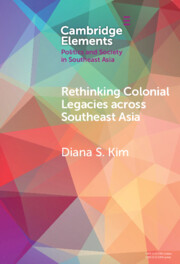1714 results in South-East Asian government, politics and policy
States against Nations
- Meritocracy, Patronage, and the Challenges of Bureaucratic Selection
- Coming soon
-
- Expected online publication date:
- May 2025
- Print publication:
- 31 May 2025
-
- Book
- Export citation

Rethinking Colonial Legacies across Southeast Asia
- Through the Lens of the Japanese Wartime Empire
-
- Published online:
- 17 March 2025
- Print publication:
- 17 April 2025
-
- Element
- Export citation
Table of Treaties
-
- Book:
- Statelessness in Asia
- Published online:
- 19 December 2024
- Print publication:
- 23 January 2025, pp 359-361
-
- Chapter
- Export citation
4 - Hidden Statelessness Dimensions of State Succession in Central Asia
- from Part I - Asia and the Phenomenon of Statelessness
-
-
- Book:
- Statelessness in Asia
- Published online:
- 19 December 2024
- Print publication:
- 23 January 2025, pp 94-122
-
- Chapter
- Export citation
Part II - Statelessness and Intersecting Vulnerabilities
-
- Book:
- Statelessness in Asia
- Published online:
- 19 December 2024
- Print publication:
- 23 January 2025, pp 155-258
-
- Chapter
- Export citation
Part III - Challenges and Prospects for Change
-
- Book:
- Statelessness in Asia
- Published online:
- 19 December 2024
- Print publication:
- 23 January 2025, pp 259-353
-
- Chapter
- Export citation
Notes on the Cover Image
-
- Book:
- Statelessness in Asia
- Published online:
- 19 December 2024
- Print publication:
- 23 January 2025, pp xvii-xvii
-
- Chapter
- Export citation
10 - Stranded in Limbo
- from Part III - Challenges and Prospects for Change
-
-
- Book:
- Statelessness in Asia
- Published online:
- 19 December 2024
- Print publication:
- 23 January 2025, pp 261-280
-
- Chapter
- Export citation
Abbreviations
-
- Book:
- Statelessness in Asia
- Published online:
- 19 December 2024
- Print publication:
- 23 January 2025, pp xviii-xx
-
- Chapter
- Export citation
8 - Doubtful Citizens
- from Part II - Statelessness and Intersecting Vulnerabilities
-
-
- Book:
- Statelessness in Asia
- Published online:
- 19 December 2024
- Print publication:
- 23 January 2025, pp 203-230
-
- Chapter
- Export citation
5 - Conflict and Statelessness
- from Part I - Asia and the Phenomenon of Statelessness
-
-
- Book:
- Statelessness in Asia
- Published online:
- 19 December 2024
- Print publication:
- 23 January 2025, pp 123-154
-
- Chapter
- Export citation
13 - Persuading to Ratify
- from Part III - Challenges and Prospects for Change
-
-
- Book:
- Statelessness in Asia
- Published online:
- 19 December 2024
- Print publication:
- 23 January 2025, pp 328-353
-
- Chapter
- Export citation
Contents
-
- Book:
- Statelessness in Asia
- Published online:
- 19 December 2024
- Print publication:
- 23 January 2025, pp v-vi
-
- Chapter
- Export citation
12 - Addressing Statelessness through the Human Rights and Development Frameworks
- from Part III - Challenges and Prospects for Change
-
-
- Book:
- Statelessness in Asia
- Published online:
- 19 December 2024
- Print publication:
- 23 January 2025, pp 302-327
-
- Chapter
- Export citation
Editor Bios
-
- Book:
- Statelessness in Asia
- Published online:
- 19 December 2024
- Print publication:
- 23 January 2025, pp vii-viii
-
- Chapter
- Export citation
9 - Statelessness and Heritagization in Southeast Asia
- from Part II - Statelessness and Intersecting Vulnerabilities
-
-
- Book:
- Statelessness in Asia
- Published online:
- 19 December 2024
- Print publication:
- 23 January 2025, pp 231-258
-
- Chapter
- Export citation
3 - Discrimination and Childhood Statelessness in Southeast Asia
- from Part I - Asia and the Phenomenon of Statelessness
-
-
- Book:
- Statelessness in Asia
- Published online:
- 19 December 2024
- Print publication:
- 23 January 2025, pp 63-93
-
- Chapter
- Export citation
11 - Statelessness in Myanmar
- from Part III - Challenges and Prospects for Change
-
-
- Book:
- Statelessness in Asia
- Published online:
- 19 December 2024
- Print publication:
- 23 January 2025, pp 281-301
-
- Chapter
- Export citation
7 - Gender, Nationality and Statelessness
- from Part II - Statelessness and Intersecting Vulnerabilities
-
-
- Book:
- Statelessness in Asia
- Published online:
- 19 December 2024
- Print publication:
- 23 January 2025, pp 178-202
-
- Chapter
- Export citation
Contributors
-
- Book:
- Statelessness in Asia
- Published online:
- 19 December 2024
- Print publication:
- 23 January 2025, pp ix-xiv
-
- Chapter
- Export citation

